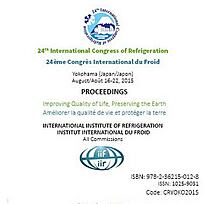
Document IIF
Évaluation du cycle de vie des chaînes du froid du saumon: comparaison entre les technologies de réfrigération et de super-réfrigération.
Life cycle assessment of salmon cold chains: comparison between chilling and superchilling technologies.
Numéro : pap. n. 440
Auteurs : HOANG H. M., LEDUCQ D., BROWN T., et al.
Résumé
The cold chain is defined as a set of refrigeration steps that maintain the quality and safety of food product. Refrigerant leakage and the use of fossil fuels to produce electrical power for refrigeration equipment contribute greatly to ozone depletion and global warming. Thus, new and emerging refrigeration technologies are developed to provide better energy efficient and environmentally friendly alternatives to current technologies. Superchilling is a concept where the temperature is reduced 1-2 °C below the initial freezing point of the product. The small amount of ice formed within the product (10-15%) serves as a heat sink, eliminating the need for ice during storage and transport. In this work, Life Cycle Assessment (LCA) is applied to the chilling and superchilling salmon cold chains. The superchilling cold chain presents an important improvement compared to the chilled one because of the augmentation of available volume for transportation.
Documents disponibles
Format PDF
Pages : 8 p.
Disponible
Prix public
20 €
Prix membre*
Gratuit
* meilleur tarif applicable selon le type d'adhésion (voir le détail des avantages des adhésions individuelles et collectives)
Détails
- Titre original : Life cycle assessment of salmon cold chains: comparison between chilling and superchilling technologies.
- Identifiant de la fiche : 30015857
- Langues : Anglais
- Sujet : Environnement
- Source : Proceedings of the 24th IIR International Congress of Refrigeration: Yokohama, Japan, August 16-22, 2015.
- Date d'édition : 16/08/2015
- DOI : http://dx.doi.org/10.18462/iir.icr.2015.0440
Liens
Voir d'autres communications du même compte rendu (657)
Voir le compte rendu de la conférence
Indexation
-
THE COLD CHAIN FOR FRESH FARMED NORWEGIAN SALMON.
- Auteurs : MAGNUSSEN O. M., NORDTVEDT T. S., NAKSTAD N. K.
- Date : 18/09/1990
- Langues : Anglais
- Source : Chilling and Freezing of New Fish Products.
- Formats : PDF
Voir la fiche
-
Use of partial freezing in the cold chain.
- Auteurs : MAGNUSSEN O. M., NORDTVEDT T. S., TORSTVEIT A. K.
- Date : 2000
- Langues : Anglais
- Source : Advances in the Refrigeration Systems, Food Technologies and Cold Chain
- Formats : PDF
Voir la fiche
-
Analysis of the best cold chain for the conserv...
- Auteurs : JIMÉNEZ R., ARVELO F., MEDINA E., GARCÍA F.
- Date : 16/09/1998
- Langues : Anglais
- Source : Hygiene, Quality and Safety in the Cold Chain and Air Conditioning.
- Formats : PDF
Voir la fiche
-
A COLD CHAIN FOR PREPACKED FRESH FISH.
- Auteurs : MAGNUSSEN O. M.
- Date : 07/08/1983
- Langues : Anglais
- Source : [Refrigeration serving humanity]. Proceedings of the XVIth international Congress of Refrigeration.
- Formats : PDF
Voir la fiche
-
Chilled and frozen Atlantic salmon: Environment...
- Auteurs : REDO M. A., CHE M., WATANABE M., TOLSTOREBROV I.
- Date : 11/06/2024
- Langues : Anglais
- Source : 8th IIR International Conference on Sustainability and the Cold Chain. Proceedings: June 9-11 2024
- Formats : PDF
Voir la fiche
